中考英语专题复习——简单句
- 格式:doc
- 大小:71.00 KB
- 文档页数:6
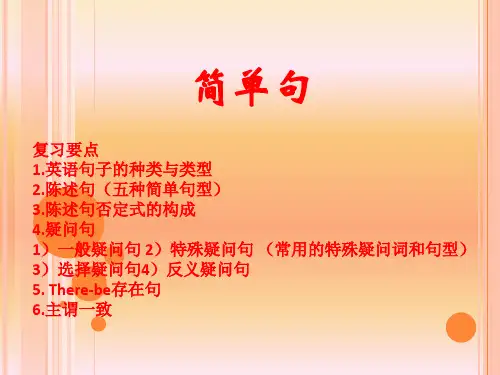
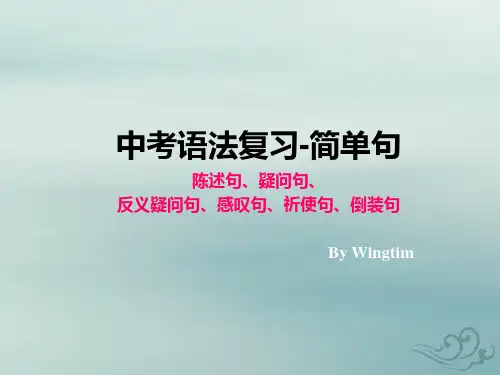
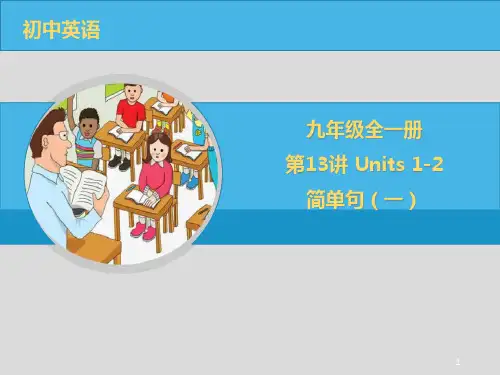

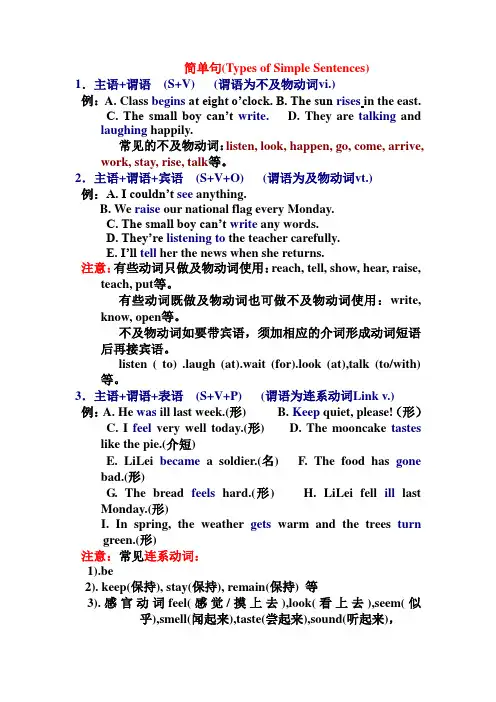
简单句(Types of Simple Sentences)1.主语+谓语(S+V) (谓语为不及物动词vi.)例:A. Class begins at eight o’clock. B. The sun rises in the east.C. The small boy can’t write.D. They are talking andlaughing happily.常见的不及物动词:listen, look, happen, go, come, arrive, work, stay, rise, talk等。
2.主语+谓语+宾语(S+V+O) (谓语为及物动词vt.)例:A. I couldn’t see anything.B. We raise our national flag every Monday.C. The small boy can’t write any words.D. They’re listening to the teacher carefully.E. I’ll tell her the news when she returns.注意:有些动词只做及物动词使用:reach, tell, show, hear, raise, teach, put等。
有些动词既做及物动词也可做不及物动词使用:write, know, open等。
不及物动词如要带宾语,须加相应的介词形成动词短语后再接宾语。
listen ( to) .laugh (at).wait (for).look (at),talk (to/with)等。
3.主语+谓语+表语(S+V+P) (谓语为连系动词Link v.)例:A. He was ill last week.(形) B. Keep quiet, please!(形)C. I feel very well today.(形)D. The mooncake tasteslike the pie.(介短)E. LiLei became a soldier.(名)F. The food has gonebad.(形)G. The bread feels hard.(形) H. LiLei fell ill lastMonday.(形)I. In spring, the weather gets warm and the trees turngreen.(形)注意:常见连系动词:1).be2). keep(保持), stay(保持), remain(保持) 等3).感官动词feel(感觉/摸上去),look(看上去),seem(似乎),smell(闻起来),taste(尝起来),sound(听起来),appear(看上去,显得)等。
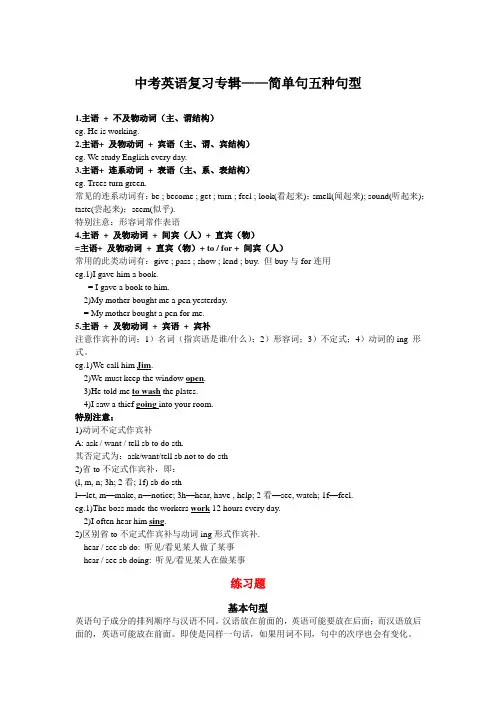
中考英语复习专辑——简单句五种句型1.主语+ 不及物动词(主、谓结构)eg. He is working.2.主语+ 及物动词+ 宾语(主、谓、宾结构)eg. We study English every day.3.主语+ 连系动词+ 表语(主、系、表结构)eg. Trees turn green.常见的连系动词有:be ; become ; get ; turn ; feel ; look(看起来);smell(闻起来); sound(听起来);taste(尝起来);seem(似乎).特别注意:形容词常作表语4.主语+ 及物动词+ 间宾(人)+ 直宾(物)=主语+ 及物动词+ 直宾(物)+ to / for + 间宾(人)常用的此类动词有:give ; pass ; show ; lend ; buy. 但buy与for连用eg.1)I gave him a book.= I gave a book to him.2)My mother bought me a pen yesterday.= My mother bought a pen for me.5.主语+ 及物动词+ 宾语+ 宾补注意作宾补的词:1)名词(指宾语是谁/什么);2)形容词;3)不定式;4)动词的ing 形式。
eg.1)We call him Jim.2)We must keep the window open.3)He told me to wash the plates.4)I saw a thief going into your room.特别注意:1)动词不定式作宾补A: ask / want / tell sb to do sth.其否定式为:ask/want/tell sb not to do sth2)省to不定式作宾补,即:(l, m, n; 3h; 2看; 1f) sb do sthl—let, m—make, n—notice; 3h—hear, have , help; 2看—see, watch; 1f—feel.eg.1)The boss made the workers work 12 hours every day.2)I often hear him sing.2)区别省to不定式作宾补与动词ing形式作宾补.hear / see sb do: 听见/看见某人做了某事hear / see sb doing: 听见/看见某人在做某事练习题基本句型英语句子成分的排列顺序与汉语不同。
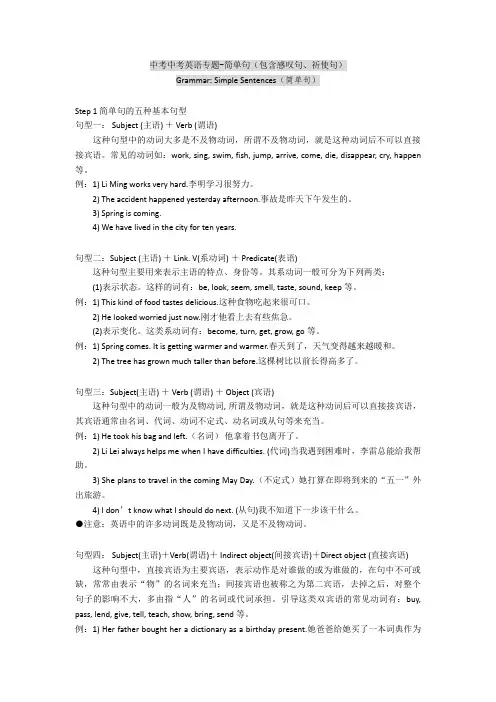
中考中考英语专题-简单句(包含感叹句、祈使句)Grammar: Simple Sentences(简单句)Step 1 简单句的五种基本句型句型一: Subject (主语) + Verb (谓语)这种句型中的动词大多是不及物动词,所谓不及物动词,就是这种动词后不可以直接接宾语。
常见的动词如:work, sing, swim, fish, jump, arrive, come, die, disappear, cry, happen 等。
例:1) Li Ming works very hard.李明学习很努力。
2) The accident happened yesterday afternoon.事故是昨天下午发生的。
3) Spring is coming.4) We have lived in the city for ten years.句型二:Subject (主语) + Link. V(系动词) + Predicate(表语)这种句型主要用来表示主语的特点、身份等。
其系动词一般可分为下列两类:(1)表示状态。
这样的词有:be, look, seem, smell, taste, sound, keep等。
例:1) This kind of food tastes delicious.这种食物吃起来很可口。
2) He looked worried just now.刚才他看上去有些焦急。
(2)表示变化。
这类系动词有:become, turn, get, grow, go等。
例:1) Spring comes. It is getting warmer and warmer.春天到了,天气变得越来越暖和。
2) The tree has grown much taller than before.这棵树比以前长得高多了。
句型三:Subject(主语) + Verb (谓语) + Object (宾语)这种句型中的动词一般为及物动词, 所谓及物动词,就是这种动词后可以直接接宾语,其宾语通常由名词、代词、动词不定式、动名词或从句等来充当。
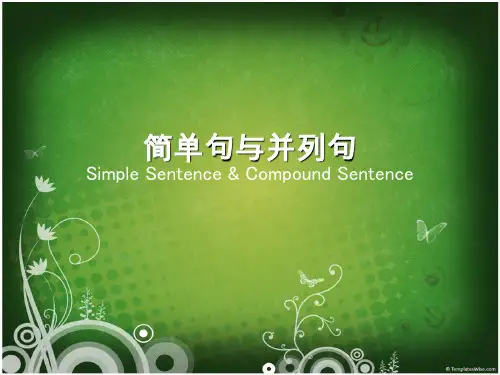
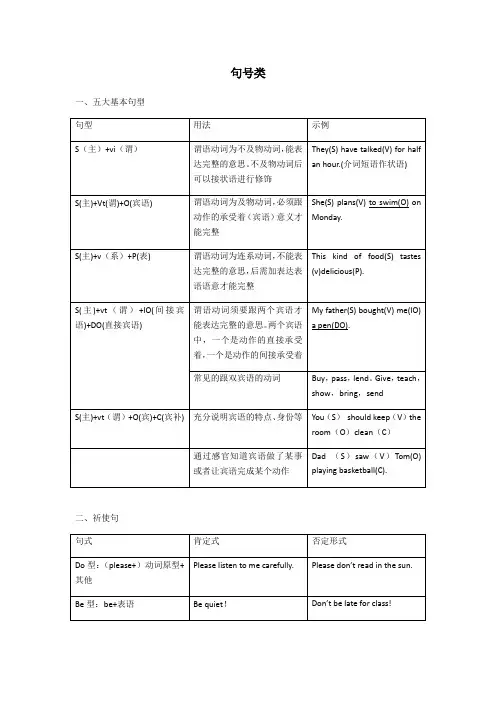
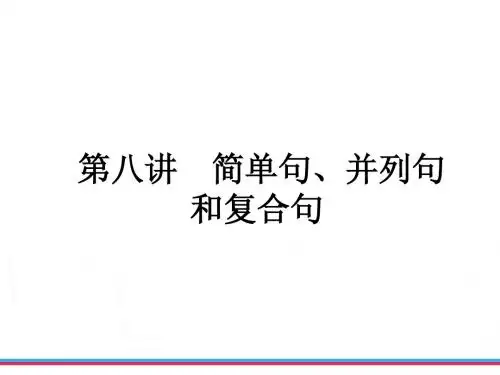
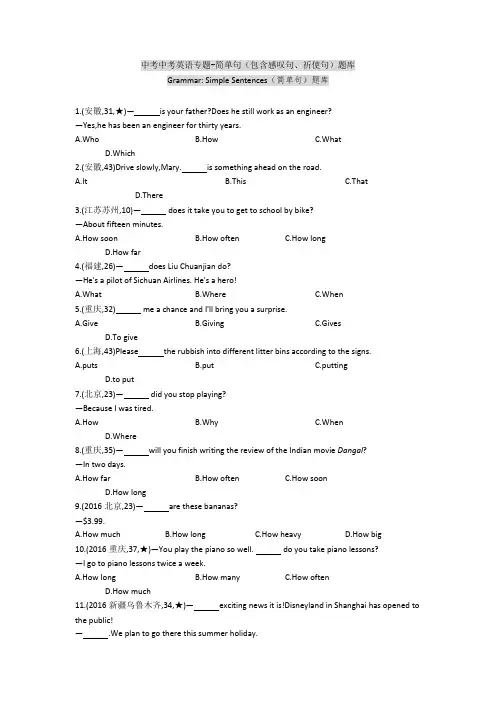
中考中考英语专题-简单句(包含感叹句、祈使句)题库Grammar: Simple Sentences(简单句)题库1.(安徽,31,★)— is your father?Does he still work as an engineer?—Yes,he has been an engineer for thirty years.A.WhoB.HowC.WhatD.Which2.(安徽,43)Drive slowly,Mary. is something ahead on the road.A.ItB.ThisC.ThatD.There3.(江苏苏州,10)— does it take you to get to school by bike?—About fifteen minutes.A.How soonB.How oftenC.How longD.How far4.(福建,26)— does Liu Chuanjian do?—He's a pilot of Sichuan Airlines. He's a hero!A.WhatB.WhereC.When5.(重庆,32) me a chance and I'll bring you a surprise.A.GiveB.GivingC.GivesD.To give6.(上海,43)Please the rubbish into different litter bins according to the signs.A.putsB.putC.puttingD.to put7.(北京,23)— did you stop playing?—Because I was tired.A.HowB.WhyC.WhenD.Where8.(重庆,35)— will you finish writing the review of the Indian movie Dangal?—In two days.A.How farB.How oftenC.How soonD.How long9.(2016北京,23)— are these bananas?—$3.99.A.How muchB.How longC.How heavyD.How big10.(2016重庆,37,★)—You play the piano so well. do you take piano lessons?—I go to piano lessons twice a week.A.How longB.How manyC.How oftenD.How much11.(2016新疆乌鲁木齐,34,★)— exciting news it is!Disneyland in Shanghai has opened to the public!— .We plan to go there this summer holiday.A.What an;So is itB.What;So it isC.How;So it isD.How;So is it12.(2016四川南充,23)—Is there a watermelon on the table?—A.Yes, there is.B.Yes, it is.C.No, there is.D.No, it isn't.13.(2016湖北襄阳,35)— are the students in your class?—Most of them are only fourteen.A.How longB.How oldC.How manyD.How often14.(2016山东烟台,22)— is it from your home to school?—It's about ten minutes' walk.A.How longB.How farC.How manyD.How much15.(2016湖南张家界,17)Playing computer games too much bad for students' health.A.amB.isC.are16.(福建,30)— has Hong Kong been back to our motherland?—For 20 years. How time flies!A.How soonB.How longC.How often17.(黑龙江哈尔滨,1)—The summer vacation is coming. Why don't you go to the beach to en-joy the sunshine?—Sounds great. advice!A.What goodB.How goodC.What a good18.(黑龙江哈尔滨,12)— is it from your house to the bookstore?—It's about fifteen minutes' walk.A.How longB.How farC.How often19.(吉林长春,19)—The Changchun subway will be in use. will it take you to get to school on it?—Only ten minutes. It'll be quick and convenient.A.Hon muchB.How manyC.How oftenD.How long20.(江苏扬州,9)—I went from a school desk to a ship in my teens.— days would you be at sea? Homesick?A.How longB.How manyC.How muchD.How soon21.(江苏连云港,5)— do the students in your school do outdoor activities every day? —At least an hour.A.How oftenB.How longC.How muchD.How far22.(江苏南京,9)—Millie, do you take the course in DIY?—Every Saturday afternoon.A.how longB.how farC.how muchD.how often23.(江苏扬州,7)— bad news! We didn't win the 15th Sudirman Cup.—It's a pity.A.WhatB.What aC.HowD.How a24.(江苏连云港,3)— delicious food you served us tonight! Thank you very much!—I'm glad that you enjoyed it.A.HowB.How aC.WhatD.What a25.(江苏盐城,3) fine weather it is! Let's go on a picnic.A.What aB.WhatC.HowD.How a26.(江苏宿迁,6)—Have you heard that Lin Tao saved his neighbour from a big fire lastnight?—Yes. brave young man he is!A.HowB.How aC.WhatD.What a27.(江苏南京,2)Look! There a photo of our English teacher in today's newspaper!A.isB.areC.haveD.has28.(江苏南京,5)—Excuse me, but can you tell me where the nearest bank is?—Just going for two more blocks and you'll see it.A.keepB.to keepC.keepingD.keeps29.(云南,23)— do you visit your grandparents?—Once a month.A.How oftenB.How longC.How soonD.How far30.(吉林长春,15) wonderful The Reader is! Many people enjoy this TV program.A.HowB.How aC.WhatD.What a31.(吉林长春,18) for me at the bus station across from the post office. I can find you easily.A.WaitB.To waitC.WaitingD.Waits32.(2016江苏苏州,8)— pale you look! Are you feeling all right?—I'm not feeling well. I've got toothache.A.How aB.HowC.What aD.What33.(2016江苏镇江,8)—The world top player South Korean Lee lost the game against the computerprogram AlphaGo.— surprising news!A.What aB.WhatC.HowD.How a34.(2016江苏连云港,12)— will the 6th Chinese Film Festival in France last?—From May 24th to July 19th.A.How oftenB.How soonC.How longD.How many35.(2016江苏连云港,3)— heavy the rainstorm is!—Yes,the town has experienced the most serious flood during the past ten years.A.HowB.WhatC.How aD.What a36.(2016福建福州,32)— angry Kangkang looks! What happened?—He found his mother reading his diary when he returned home yesterday.A.HowB.WhatC.What an37.(2016福建福州,23)— is the nearest hospital from here?—Er, it's about ten minutes' walk.A.How longB.How farC.How often38.(2016吉林,32)—Do you know some robots are able to serve as waiters in restaurants? —Really? interesting it is!A.WhatB.What aC.How39.(2016山东烟台,25)— weather it is! Shall we go for a picnic?—I can't agree more.A.What a goodB.What goodC.How good theD.How good40.(2016山东青岛,3)— do you usually share happiness with?—My parents and my best friend.A.WhoB.WhoseC.WhatD.How41.(2016广东,33)Tommy, play basketball in the street next time. You may get hit by a car.A.doB.don'tC.mustD.mustn't42.(2016广东,41)—It is reported that cancer can be controlled at a temperature lower than 110℃below zero.—Really? nice surprise!A.HowB.WhatC.What aD.What an43.(2016浙江温州,5)—Do you know that the Terracotta Army in China is more than 2,000 years old?—Wow! !A.How large it isB.How modern it isC.What a long history it hasD.What a beautiful place it is44.(亳州蒙城县一模,38)— do you deal with the stress?—By having a talk with my friends.A.HowB.WhyC.WhenD.Where45.(亳州蒙城县一模,44)Hey,Nick! comes the last bus! Hurry up, or we will have towalk home.A.ThisB.HereC.ThatD.It46.(安徽模拟二,39)—Volunteers from Lantian Saving Team have saved many travellers in the mountains.— they are!A.How great a manB.How great menC.What a great manD.What great men47.(合肥押题一,39) dangerous it is for children to play in the street!A.WhatB.HowC.How aD.What a48.(2016安徽黑卷,37)— does that girl play the piano in the club? Her performance is so wonderful.—She plays every night.A.How farB.How muchC.How soonD.How often49.(2016合肥十校大联考三,32)— do you like best?—Orange, because orange can bring me success.A.WhatB.WhyC.WhichD.What colour50.(阜阳颍上五中月考,10)— give us a talk on modern science?—I'd love to, but I'm leaving for New York tomorrow.A.Would you likeB.How aboutC.Would you mindD.Could you please51.(阜阳颍上五中月考,15) great thing it is to swim in summer!A.What aB.WhatC.HowD.How a52.(马鞍山当涂县联考,39) great fun they are having!A.WhatB.What aC.HowD.How a53.(马鞍山二中一模,32)—Hello, Peter. Could I ask you a few questions?— Feel free.A.Nothing serious.B.Don't mention it!C.That's right.D.Of course!54.(江淮名校联考,27) exciting boat race it was!Many people watched it.A.What aB.What anC.HowD.How a55.(亳州涡阳县月考,38) you stay here for lunch, please?A.WillB.NeedC.MustD.Do56.(合肥50中三模,31)— is the boy with a pair of glasses?—My brother John.A.HowB.WhoC.WhereD.What57.(合肥押题一,38)carefully,Mr Brown!There is a primary school ahead.It's time for school now!A.DriveB.To driveC.DrivingD.Drove58.(阜阳陈梦中学一模,34)—Where shall we eat for supper, Mum? At home or in the restaurant? — It is your birthday today.A.No idea.B.It is up to you.C.Why not?D.Hard to say.59.(合肥38中二模,38)—Hello, sir. Is there anything I can do for you?—A.Yes, there is.B.No, there isn't.C.That's right.D.I'd like a scarf.二、英语书面表达专项训练2.手机在生活中扮演着越来越重要的角色,许多中学生沉迷于手机无法自拔,比如你的好友Miller.请根据以下提示点写一篇短文:1. 去年,Miller对手机游戏非常入迷,而且花大量时间用手机聊天看电影;2. Miller与家人和朋友交流甚少,离开手机会很焦虑;3. 昨天还因为走路看手机被自行车撞了,膝盖受伤;4. 你的建议……参考词汇:mobile games手机游戏anxious焦虑be crazy about对……入迷要求:1字数80-100个2开头已经给出不计入总词数3要点齐全,行为连贯,适当发挥Today more and more people are addicted to(沉迷)playing the mobile phones. Last year, My friend Miller was【答案】Today more and more people are addicted to(沉迷)playing the mobile phones. Last year,My friend Miller was crazy about mobile games as well. He spent too much time in chatting and watching films on the phone. Miller hardly talked with his family and friends. Helived in his own world. He felt very anxious without mobile phones. Yesterday he was hit by a bike, because he was watching his phone at that moment. As a result, he hurt his knees badly.In my opinion, I think we can’t use the mobile phones for a long time, I mean, no more than half an hour a day. D on’t take mobile phones to school. A mobile phone is just a kind of tool, not our whole life.【解析】【详解】这是一篇给材料作文。
十、简单句1、简单句的特点:简单句通常只由一个主语(或并列主语)和一个谓语(或并列谓语)构成。
2、简单句的种类:简单句一般分为陈述句、疑问句、感叹句和祈使句四种。
3、陈述句:用来说明一个事实的句子叫陈述句。
它有肯定式和否定式两种形式。
▲陈述句的肯定式:He is a middle school student.(他是个中学生)/ I have a hammer in my hand.(我手上有把锤子)/ She teaches us geography.(她教我们地理)/ The new play was good enough and everybody enjoyed it.(新的话剧非常好大家都喜欢)▲陈述句的否定式:1)谓语动词如果是to be 、助动词、情态动词时,在它们的后面加“not”。
如:My brother is not a teacher.(我的弟弟不是教师)/ He does not have a cousin.(他没有堂兄弟)/ I will not go there tomorrow.(明天我不去那儿)/ My mother is not cooking a meal in the kitchen.(我母亲现在不在厨房里做饭)/ You must not make such mistakes again.(你不该再犯类似错误了) / We haven’t discussed the question yet(我们还没有讨论那个问题呢).2)谓语动词如果没有上述词语而是其他动词时,须在它的前面加do not(don’t).如:I don’t know anything about it.(此事我一无所知)/ Li Ming does not feed pigs in the countryside.(李明不在农村养猪)/ We didn’t expect to meet her right here.(我们没指望着在这里见到她)/We didn’t have a meeting yesterday afternoon.(昨天下午我们没有开会)3)如果“have”作“有”讲,也可以在它后面加not构成否定式,其形式与have got的否定式相同。
简单句、并列句和复合句考点一简单句1.简单句只包含一个主谓结构.2.五种简单句:1)主+谓. He comes at last.2)主+系+表. She is a teacher.The soup tastes nice.3)主+谓+宾. They reached the village.4)主+谓+间宾+直宾. He gave me a pen.5)主+谓+宾+宾补. I find that book very useful.考点二并列句并列句:两个或两个以上的简单句,用连词连接起来;常用的连接词有:1.表示顺承关系的:and, not only…but also不仅….而且….等;She ______ gave us a lot of advice, _______ helped us to overcome difficulties.Linda tried to become an excellent teacher, _____ at last she succeeded.2.表示选择关系和否定条件的有or还是,否则Do you want to leave now ____ would you rather set off laterWear your coat, ____ you’ll catch a cold.3.表示转折关系的有but, yet等;He is young, but he works hard.虽然他年轻,但工作努力;4.表示因果关系的有for, so 等;My leg hurts so I go to see a doctor. 我的腿疼,因此我去看医生;考点三主从复合句:宾语从句1.宾语从句的引导词1引导陈述句用 that在口语和非正式文体中常常省略He tells me that he is going shopping this Sunday.2 引导一般疑问句用if或whether.She asked me if\ whether she could join us. whether…or not3 引导特殊疑问句,要用原来的特殊疑问词;She asked them what they were doing.2.宾语从句的语序:要用陈述句语序;I want to know when the train left.3. 宾语从句的时态1主句是一般现在时,一般将来时或祈使句,宾语从句可根据实际需要选用各种时态;He tells us that he has been able to look after himself.(2)主句是过去时态,宾语从句应使用过去时的相应时态;They said that they had already finished the work.(3)如果宾语从句叙述的是客观事实、真理、自然现象等,不管主句用什么时态,从句都用一般现在时;He said that light travels faster than sound.3. 练习1She asked me, “Will you go to the cinema tomorrow”改为含宾语从句的复合句She asked me______ I ______ go to the cinema the next day.2 How lovely the dog is Can you tell me _____A. where did you get itB. where will you get itC. where you got it3 --- Can you tell me _____ your parents at home--- I often wash clothes and sweep the floor.A.how will you helpB. how you helpC. how will you helpD. howdo you help4 When I was young, my grandfather told me that the sun ______ rise in the east.考点四状语从句一、状语从句在复合句中作状语,修饰主句中的动词、形容词、副词等;1.地点状语从句地点状语从句通常由 where 引导;Put all the things _____they were.A. whereB. whenC. whoseD. which2.时间状语从句主句用将来时,从句用一般现在时时间状语从句的引导词有when, before, after, until, as soon as, since, while, as 等She was cooking when someone knock at the door.What will you do after you finished your homework3.条件状语从句在条件状语从句中,常用的引导词有if, unless等;If it dosen’t rain, I” ll go fishing.They will have a picnic unless it rains next Sunday.4.原因状语从句原因状语从句常用的引导词有because, as, since既然等He didn’t come because he was ill.Since we are students, we should study hard.Because 和so 不能在一个句子中同时使用;5. 结果状语从句结果状语从句主要由so…that…, such…that…引导;It’s so hot that we want to go swimming.That’s such an interesting story that everybody likes it.So… that…与简单句之间的句型转换1)that后的句子是否定句,常用too…to进行转换;He is so young that he can’t go to school. he is too young to go to school.2)that后的句子是肯定句;常用enough to 进行转换;The shirt was so cheap that he bought it. the shirt was cheap enough for him to buy.6.目的状语从句目的状语从句常用的引导词有so that, in order that 等 in order to 简单句Please say it in a loud voice so that everyone can hear it.He works harder in order that he can go to a good college.7. 让步状语从句引导词有though, although, even if, even though尽管等;He often helps others though\ although he is not rich.They will stand by you even if you don’t succeed.Though, although与but 不能同时出现在一个句子中8.比较状语从句比较状语从句由than, as…as…, not as\so… as等引导;比较级He is more outgoing than I.He ran as fast as Mike.二、练习1. It’s quite common in Britain to say “thank you”to the drivers _____ people get off the bus.a. afterb. sincec. untild. when2. The art club is for members only. You can’t go in ____you are a member.a. unlessb. becausec. ifd. though3. Now many parents send their children to foreign countries, _____ they want them to get a better education.a. untilb. thoughc. because4. ---- What would some students like to do after finishing their education---- They would like to start to work_______ they needn’t depend on their parents completely.a. as soon asb. so thatc. befored. while考点五定语从句修饰某一名词或代词的从句叫定语从句;被定语从句修饰的词叫先行词,引导定语从句的词叫关系词关系代词和关系副词;1.关系代词的基本用法The man __________spoke at the meeting is from Hong Kong. 指人作主语The building ___________is being built will be used as a hospital.指物作主语I visited a scientist _______ name is known all over the world. 指人作定语2. 关系代词特殊用法1当关系代词在从句中作主语时,从句的谓语动词要与先行词保持一致;He is one of the boys who ______ like playing football.He is the only one of the boys who________ like playing football.2 通常以下四种情况关系代词只能用that而不能用which.1 先行词为all, much, something, everything, nothing, little, none, the one 等不定代词时2先行词被形容词最高级修饰时;3当先行词被the only, the very, the just等修饰时;4先行词中既有人又有物时;3. 关系副词的基本用法;1 when 在句中作状语,表示时间;2 where 在句中作状语,表示地点;.3 why 在句中作状语,表示原因;He remembers the day _______ he joined the League.This is the reason_______ he is late today.This is the place _______ Lu Xun was born.1. 2011泰安--- _______do you read English newspapers---I read China Daily every day.A. How longB. How soonC. How oftenD. How far2.2011抚州John had a short walk after lunch, _______A. did heB. didn't heC. had heD. hadn't he3.2011宁波--- _______do you have an Art Festival in your school---Once a year.A. How longB. How oftenC. How farD. How soon4.2011安徽省If you want to go to see the movie this evening, so _______I.A. doB. amC. willD. should5.2011长沙 _______tall the girl isA. HowB. HowaC. WhatD. What a6.2011长沙 _______ call me Mimi It's my cat's name.A. NotB. Didn'tC. Doesn'tD. Don't7.2011长沙They went to the park yesterday,_______A. don't theyB. didn't theyC. aren't theyD. can't they8.2011福州---Li Mei usually helps others, _______---Yes, she is kind-hearted.A. does sheB. is sheC. doesn't she9.2011眉山There _______an English party in our school tomorrow evening.A. haveB. will haveC. is going to haveD. will be10. 2011济南--- _______a year does your school have sports meetings---Twice a year.A. How oftenB. How soonC. How longD. How many times11. 2011泰州---I have changed my job.---_______.A. So do IB. So have IC. So I doD. So I have12. 2011济南Mike learns a lot about Internet. And _______.A. I don't, eitherB. so do IC. so am I am, too13. 2011眉山Jim never goes to the movies on Saturday, _______A. does JimB. doesn't JimC. doesn't heD. does he14. 2011玉州You've just finished your listening exam Please getyourself ready for the next part, _______A. shall weB. will youC. do youD. are you15. 2011眉山--- _______the weather like last Monday---It was sunny.A. How wasB. What'sC. What wasD. How is16. 2011潍坊_______great scientist Qian Xuesen isA. HowB. HowaC. WhatD. What a17. 2011眉山--- _______do you visit your grandparents---Once a month.A. How soonB. How longC. How muchD. How often18. 2011内江--- _______ do you speak English so well---Because I practice it with my partner every day.A. WhyB. WhenC. Who19. 2011泉州---We'll go to Qing Yuan Mountain tomorrow. Why _______join us---That's a good idea.A. notB. don'tC. can'tD. didn't20. 2011泉州There is little milk in the glass, _______A. is thereB. isn't thereC. isn't itD. does it21. 2011肇庆The students in Class Two played basketball against ClassOne yesterday,_____A. did theyB. didn't theyC. weren't they22. 2011宁波---What a new computer Can you tell me_______---Just the day before yesterday.A. how much you paid for itB. how much did you pay for itC. when you bought itD. when did you buy it23. 2011泰安---Tom wants to know if you will have a picnic tomorrow.---Yes. But if it _______, we'll play chess instead.A. will rainB. rainedC. is rainingD. rains24. 2011烟台---Do you know this dictionary belongs to---Let me see. Oh, it's_______.A. who does; mineB. who; meC. whose; mineD. who; mine25. 2011杭州Franklin told them all _______to be in Britain again.A. he was how happyB. how happy he wasC. how was he happyD. he was happy how26. 2011湖州---What kind of movies do you like---I like the movies_______ are about Chinese history.A. whoB. whomC. whoseD. that27. 2011丽水---Do you know _______---Sorry, I don't have a watch.A. whose watch this isB. whose watch is thisC. what time it isD. what time is it28. 2011重庆The woman asked the policeman where _______.A. the post office isB. the post office wasC. is the post officeD. was the post office29. 2011泰安---Can you guess_______ the new schoolbag yesterday.----Sorry, I've no idea.A. how much did he pay forB. how much he spentC how much he paid for D. how much did he spend30. 2011杭州Who is the man_______ is reading a book over thereA. thatB. whichC. whoseD. what31. 2011湖州---Do you know_______---Next Sunday.A. what they will doB. where they will doC. when they will come hereD. who they will meet32. 2011长沙---Can you tell me why_______---Because I want to help the people there.A. do you go to Tibet西藏B. did you go to TibetC are you going to Tibet D. you are going to Tibet33. 2011浙江省---Linda, could you tell me _______---He is an actor.A. what he doesB. what does he doC where he works D. where does he work34. 2011福州---Could you tell me _______---Sure. The day after tomorrow.A. when will you leave for the U.S.A.B. when Mr. Lee will comeC when your father returned35. 2011济南He asked me_______.A. who did kick the first goal in the World CupB. when was the A. PEC meeting heldC when China became a member of the WTOD. where will the 2008 Olympics be held36. 2011玉州Jane is one of the students in the class _______ have everbeen to China.A. whoB. whoseC. whichD. whom37. 2011济宁Can you tell me _______after this examA. what you didB. what did you doC. what will you doD. what you will do38. 2011苏州---Can you tell me how many colours _______ in a rainbow---SevenA. there areB. are thereC. they areD. are they39. 2011潍坊I can't understand _______Apple's iPad 2.A. why are they so mad aboutB. why they are so mad aboutC. how are they so mad aboutD. how they are so mad a。
中考英语语法专项复习:简单句、并列句和复合句句子按结构可分为简单句、并列句和复合句。
复合句中包含宾语从句、状语从句或定语从句等。
◆一简单句简单句就是只包含一个主谓结构的句子,其句式结构主要有五种:①主 + 谓。
He works in a big company. 他在一家大公司工作。
②主 + 系 + 表。
She is a kind girl. 她是一个善良的女孩。
③主 + 谓 + 宾。
Ann eats junk food twice a week .安一周吃两次垃圾食品。
④主 + 谓 + 间宾 + 直宾。
He gave me a pen .他给我一支钢笔。
⑤主 + 谓 + 宾 + 宾补。
He kept me waiting for two hours .他让我等了两小时。
◆二并列句并列句由两个或两个以上的简单句连接而成。
并列句中的各简单句同等重要,没有从属关系,是并列的关系,之间用并列连词连接。
1. 表示顺承的并列连词有and / not only …but (also)等。
如:She not only gaveus a lot of advice, butalso helped us to overcome difficulties .他不仅给了我们很多建议,而且还帮助我们克服困难。
2. 表示选择的并列连词有or,either …or …等。
如:Either you or Maria will haveto go .你或玛丽亚得去一趟。
3. 表示转折的并列连词有but,yet,however 等。
如:It is hot in summer here , butit’s not cold in winter .这里夏天热,但冬天不冷。
4. 表示因果关系的并列连词有so,如:He works hard , so he is one of the topstudents in our class .因为他学习努力,所以他是我们班最优秀的学生之一。
中考英语专项复习之简单句一:简单句的特点简单句通常只由一个主语(或并列主语)和一个谓语(或并列谓语)构成。
如:He has made great progress in his English recently.My classmates and I often play soccer after school.Yesterday we went to the zoo and took some photos.二:简单句的种类:简单句一般分为陈述句、疑问句、感叹句和祈使句四种。
三:陈述句用来说明一个事实的句子叫陈述句。
它有________式和________式两种形式。
▲陈述句的肯定式:He ________(be)a middle school student.She ________(can play)the piano when she was five.She ________(teach)us geography.Everybody ________(enjoy)themselves at the party last night.She ________(remember)more than 1000 words since last term.▲陈述句的否定式:1)谓语动词如果是be 、助动词(have,has)、情态动词时,其否定式都是在它们的后面加“________”。
如:My brother ________ a teacher.(我的弟弟不是教师)My mother ________ a meal in the kitchen now.(我母亲现在不在厨房里做饭)I ____ ____ go there tomorrow.(明天我不去那儿)You ____ ____ such mistakes again.(你不该再犯类似错误了)We ____ ____ the question yet.(我们还没有讨论那个问题呢).2)谓语动词是实义动词时,须在它的前面加________或________或________.如:I ____ ____anything about it.(此事我一无所知)Li Ming ____ ____ pigs in the countryside.(李明不在农村养猪)/We ____ ____ her right here yesterday.(昨天我们没在这里见到她)四:疑问句▲一般疑问句:提问所述情况是否符合事实,要求用是还是不是,对还是错(用“yes”或“no”)来回答的疑问句叫做一般疑问句。
简单句考点一:简单句的特点(或并列主语)和一个谓语(或并列谓语)构成。
My classmates and I often play soccer after school.to the zoo and took some photos.二:简单句的种类:简单句一般分为陈述句、疑问句、感叹句和祈使句四种。
三:陈述句用来说明一个事实的句子叫陈述句。
它有________式和________式两种形式。
▲陈述句的肯定式:He ________(be)a middle school student.She ________(can play)the piano when she was five.She ________(teach)us geography.Everybody ________(enjoy)themselves at the party last night.She ________(remember)more than 1000 words since last term.▲陈述句的否定式:1)谓语动词如果是be 、助动词(have,has)、情态动词时,其否定式都是在它们的后面加“________”。
如:My brother ________ a teacher.(我的弟弟不是教师)My mother ________ a meal in the kitchen now.(我母亲现在不在厨房里做饭)I ____ ____ go there tomorrow.(明天我不去那儿)You ____ ____ such mistakes again.(你不该再犯类似错误了)We ____ ____ the question yet.(我们还没有讨论那个问题呢).2)谓语动词是实义动词时,须在它的前面加________或________或________.如:I ____ ____anything about it.(此事我一无所知)Li Ming ____ ____ pigs in the countryside.(李明不在农村养猪)/We ____ ____ her right here yesterday.(昨天我们没在这里见到她)四:疑问句▲一般疑问句:提问所述情况是否符合事实,要求用是还是不是,对还是错(用“yes”或“no”)来回答的疑问句叫做一般疑问句。
1)一般疑问句构成:①句中谓语动词是be、助动词(have,has),情态动词时,则将它们____ ____。
如:___ ___ an engineer?(他是工程师吗?)___ ___ watching TV at this time yesterday?(昨天的这个时候你在看电视吗?)___ ___ write when he was three?(三岁时他会写字吗?)___ ___finished today’s task yet? (你已经完成今天的任务了吗?)②谓语动词是实义动词时, 则在主语 _加助动词____ _/____ / ____ . 如:__ _ you __ _at six every morning?(你天天早晨六点起身吗?)/__ _she __ _ hard?(她学习努力吗?)/①观察以下例句来总结句型How often do you have English class every week?What does her mother work?How did the people spend their life in the past?一般过去/现在时的特殊疑问句句型是:__ .②观察以下例句来总结句型How soon will the workers finish building the bridge?Where will they plan to visit next week?What are you going to do in the future?Which style of dress are you going to choose ?一般将来在时的特殊疑问句句型是:__ .或:__ .③观察以下例句来总结句型What were you doing at this time yesterday?What are they talking about now?过去/现在进行时的特殊疑问句句型是:__ .五:反意疑问句反意疑问句表示对陈述句所说的事实提出相反的疑问,要求对方用“yes”或“no”来进行回答。
1) 构成:陈述句+附加问句。
由两部分组成:前一部分是句,后一部分是句,如果陈述句是肯定结构,反意疑问句须用结构;反之,陈述句如果是否定结构,反意疑问句须用结构。
反意疑问句的两部分, 必须保持人称和时态的一致;2) 反意问句的回答:无论哪种形式的反意问句,回答时要遵循:“Yes,+肯定式”或者“No,+否定式”如:The man went away, didn’t he?(那人走开了,不是吗?)——.(是的,他走了。
)/.(不,他没有走。
)★The man never went there, did he?(这人从来不去那里,是吗?)——.(不是呀,他去的。
)/.(是呀,他不去。
)3)特殊句型:①.祈使句。
祈使句后一般加上或构成反义疑问句,用will you多表示“请求”,用won’t you多表示提醒对方注意。
例如:Don’t talk loudly in the reading room,?Remember to bring your guitar tomorrow,?★let引导的祈使句有两种情况:let’s---,后的反义疑问句用;let us/me--- 后的反义疑问句用。
如:Let’s go home,? let me have a try,?②反意疑问句的陈述部分带有little, few, never, hardly, seldom,no, nobody, nothing,none, neither等表否定意义的词时,问句部分用式。
如:She never tells a lie,?(不用doesn’t she?)He was seldom late,?(不用wasn’t he?)③★反意疑问句的陈述部分为I(We)第一人称think(believe, suppose, consider) + that从句时,问句部分的动词及主语与that从句内的动词和主语保持一致。
如:I think that he has done his best,? (不用don’t I?)We think that English is very useful,?(不用don’t we?)★反意疑问句的陈述部分为I(We) don’t think(believe, suppose, consider)+ that从句时,从句为否定意义,问句部分的动词和主语仍与that从句保持一致且用肯定式。
如:I don’t think that you can d o it,?(不用do I?)We don’t believe that the news is true,?(不用do we?)④★陈述部分的主语为不定代词something, anything, nothing, everything时,问句部分的主语用。
如:Something is wrong with the computer,?Nothing has happened to them,?★陈述部分的主语为不定代词somebody(someone), anybody(anyone), nobody(no one), everybody(everyone),时,问句部分的主语用或如:Someone has taken the seat,?Everyone has done his best in the game,?六:感叹句感叹句用来表示喜怒哀乐等强烈感情。
句末常用“!”①what引导的感叹句(1)What a beautiful girl she is!她是一个多么漂亮的女孩呀!What an interesting book it is!这是一本多么有趣的书啊!通过例句归纳出句型:(2)What important jobs they have done!他们做了多么重要的工作呀!What beautiful flowers they are!它们是多么漂亮的花呀!通过例句归纳出句型:(3)What sweet water it is!多甜的水呀!What sunny weather it is today! 今天的天气多么的晴朗啊!通过例句归纳出句型:②how引导的感叹句(1)How interesting the dog is!多么有趣的狗呀!How useful the subject they are learning!他们正在学的科目多么有用呀!通过例句归纳出句型:(2)How happily they are playing!他们正玩得多开心啊!How quickly he runs! 他跑得多快啊!通过例句归纳出句型:选用感叹词来完成句子a beautiful flower it is! beautiful flowers they are!beautiful the flower is! bad news I heard just now!clever it is! fast he runs every time!七: 倒装句与非倒装句1. —I really hate to go to such a place. —So do I.—No one likes" Little Emperors'. —Neither do my parents.①So do I .为倒装句,表示前面提到的肯定情况也同样适合另外一个主体,表“某某也一样”,结构为“”。
如:Jim is a student, . 吉姆是一名学生,汤姆也是。
Jim can swim, . 吉姆会游泳,汤姆也会。
Jim likes sports, . 吉姆喜欢运动,汤姆也喜欢。
②如表前面不怎样,后面“也不”时,其结构为“ ”。
如:Jim isn’t Chinese,.吉姆不是中国人,他们也不是。
Jim can’t speak Japanese, .吉姆不会说日语,我也不会。
Jim hasn’t been there,.吉姆没去过那儿,我也没去过。
2. —The population in developing countries is growing faster. —So it is.So it is译成:如后者对前者的陈述表示一致时,意为“的确如此”,结构为“”。